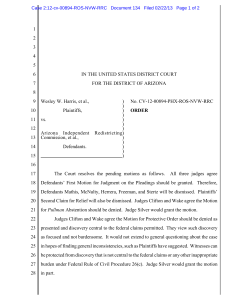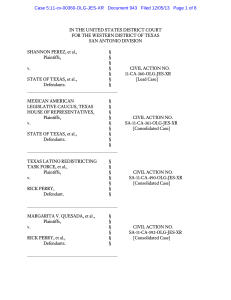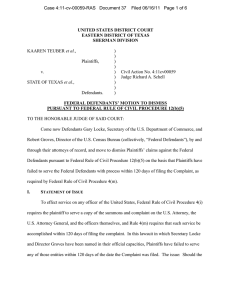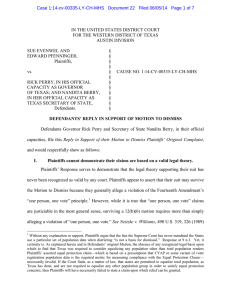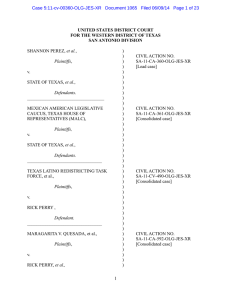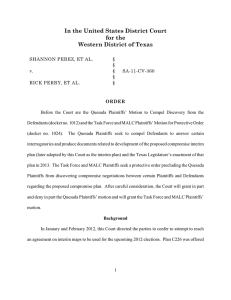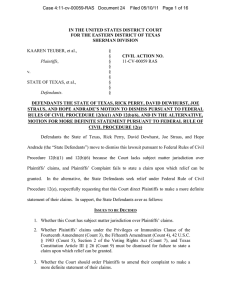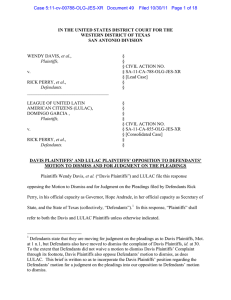UNITED STATES DISTRICT COURT FOR THE WESTERN DISTRICT OF TEXAS
advertisement
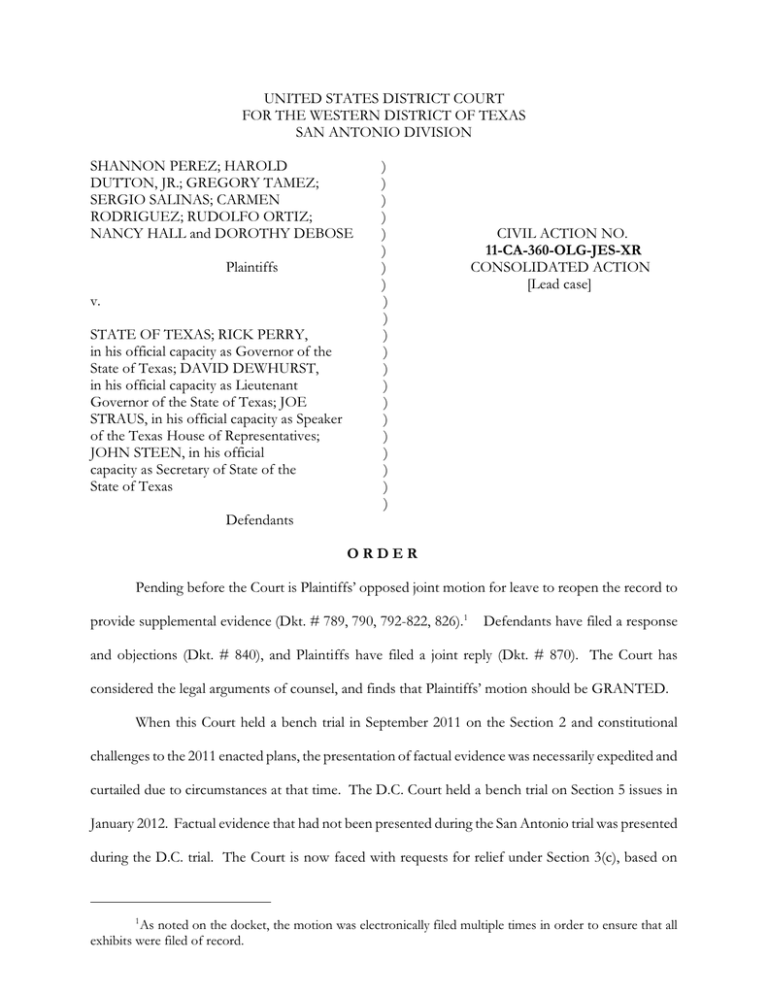
UNITED STATES DISTRICT COURT FOR THE WESTERN DISTRICT OF TEXAS SAN ANTONIO DIVISION SHANNON PEREZ; HAROLD DUTTON, JR.; GREGORY TAMEZ; SERGIO SALINAS; CARMEN RODRIGUEZ; RUDOLFO ORTIZ; NANCY HALL and DOROTHY DEBOSE Plaintiffs v. STATE OF TEXAS; RICK PERRY, in his official capacity as Governor of the State of Texas; DAVID DEWHURST, in his official capacity as Lieutenant Governor of the State of Texas; JOE STRAUS, in his official capacity as Speaker of the Texas House of Representatives; JOHN STEEN, in his official capacity as Secretary of State of the State of Texas ) ) ) ) ) ) ) ) ) ) ) ) ) ) ) ) ) ) ) ) ) CIVIL ACTION NO. 11-CA-360-OLG-JES-XR CONSOLIDATED ACTION [Lead case] Defendants ORDER Pending before the Court is Plaintiffs’ opposed joint motion for leave to reopen the record to provide supplemental evidence (Dkt. # 789, 790, 792-822, 826).1 Defendants have filed a response and objections (Dkt. # 840), and Plaintiffs have filed a joint reply (Dkt. # 870). The Court has considered the legal arguments of counsel, and finds that Plaintiffs’ motion should be GRANTED. When this Court held a bench trial in September 2011 on the Section 2 and constitutional challenges to the 2011 enacted plans, the presentation of factual evidence was necessarily expedited and curtailed due to circumstances at that time. The D.C. Court held a bench trial on Section 5 issues in January 2012. Factual evidence that had not been presented during the San Antonio trial was presented during the D.C. trial. The Court is now faced with requests for relief under Section 3(c), based on 1 As noted on the docket, the motion was electronically filed multiple times in order to ensure that all exhibits were filed of record. alleged violations in the 2011 plans, and Section 2 and constitutional challenges to the 2013 enacted plans, which emanate from the 2011 enacted plans. Plaintiffs seek leave to re-open the record for purposes of supplementing the evidence with approximately 400 documents from the D.C. record. Defendants object to supplementing the record, and would prefer that the Court rule on the current legal challenges based on the 2011 trial record. Much has occurred since the September 2011 trial, and there is much work to be done in this case. There are newly enacted plans, newly amended pleadings, and a new opportunity to review evidence that was previously unavailable to the Court. The parties are entitled to a fair and just decision on very important issues, and that decision should be based on a complete record. Having an incomplete record may harm the parties and prevent the Court from reaching a correct decision in this case. The decision as to whether a case should be re-opened to supplement the record is within the Court’s discretion. Zenith Radio Corp. v. Hazeltine Research, Inc., 401 U.S. 321, 331, 91 S.Ct. 795 (1971); Garcia v. Woman’s Hosp. of Texas, 97 F.3d 810, 814 (5th Cir. 1996). In making such a decision, the Court should consider the importance and probative value of the evidence, the reason for the moving party’s failure to introduce the evidence earlier, and the possibility of prejudice to the non-moving party. Garcia, 97 F.3d at 814. Defendants claim the exhibits have no probative value because the 2011 enacted plans have been repealed and the D.C. trial involved different legal issues. The 2011 enacted plans were repealed in the midst of litigation, but Plaintiffs’ claims are not moot because they are still seeking prospective relief under Section 3(c) of the Voting Rights Act based on alleged violations in those plans.2 Moreover, the 2013 plans emanate from the 2011 plans and most of the challenges to the 2011 enacted plans have simply been carried forward as challenges to the 2013 enacted plans. While the D.C. case did involve 2 Nothing in this order should be construed as a statement about the ultimate viability of the Section 3(c) claims that are now being urged. The Court will rule on those issues in due course. This order addresses only the reopening of the record, as explained. 2 some legal issues that are not part of the Section 2 analysis, the fact issues relating to discrimination are the same in both cases. Thus, at least in large part, the evidence from the D.C. case is clearly relevant and has probative value. Defendants further claim that the evidence should have been offered earlier and should be rejected as untimely at this juncture. Plaintiffs claim that they were diligent in providing evidence during the San Antonio trial despite severe time restraints. The State provided important evidence to Plaintiffs before the trial in the D.C. case, but after the trial in this case. Thus, Plaintiffs claim that they did not have access to the evidence being supplemented herein until after the trial in this case. The Court finds that Plaintiffs could not reasonably have offered the evidence any earlier given the circumstances under which this litigation evolved and an offer of supplemental evidence any earlier in these proceedings would have been meaningless because the Court was prevented from reaching the merits of this case. The Court held a bench trial in September 2011, but it was in a holding pattern for almost two years thereafter. The Court could not reach the merits of this case until the D.C. Court and the Supreme Court had issued final rulings and the Texas Legislature had acted. The Court became aware of the additional evidence in the D.C. case and requested such evidence when interim plans for the 2012 elections were being considered. But the evidence in the D.C. record could not be used for any other purpose – until now. With the Supreme Court’s rulings behind us, and newly enacted plans and amended pleadings, the Court may now move forward in an effort to resolve the merits of this case. Under the circumstances, Plaintiffs’ request to supplement the record is timely. Defendants also claim that they would be prejudiced by the supplementation of the record because the trial has already concluded and they have not had the opportunity to respond to the evidence by way of cross-examination or otherwise. Defendants’ argument of prejudice fails for several reasons. First, much of the evidence being offered comes from documents that have been in Defendants’ possession for at least two years. Many of the documents were created and/or generated 3 by Defendants’ own witnesses, but were not disclosed to Plaintiffs until the D.C. trial. For example, this Court heard the testimony of map drawers Gerardo Interiano and Ryan Downton during the San Antonio trial, but Plaintiffs were not aware of certain e-mail communications between the map drawers and others because Defendants had not produced them. The e-mail communications were not produced until the D.C. trial. Second, many of the documents have been equally available to Defendants for more than two years even if they did not create and/or generate the documents themselves. Third, Defendants had ample opportunity to respond to the evidence, by crossexamination or otherwise, during the D.C. trial and they will have yet another opportunity to do so in this case. The Court intends to have another trial or series of evidentiary hearings, and to the extent that discovery must be re-opened and expert or fact witnesses must be deposed or cross-examined, the parties will be given an opportunity to do so. Fourth, Defendants have the opportunity to offer their own supplemental evidence in response to the evidence being offered by Plaintiffs. And finally, the evidence does not appear to be cumulative of the evidence already admitted herein. IT IS SO ORDERED this 6th day of September, 2013. ____________/s/_________________ ORLANDO L. GARCIA UNITED STATES DISTRICT JUDGE [on behalf of the three judge panel] 4
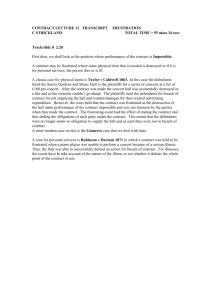
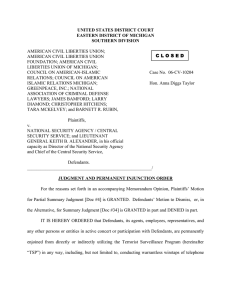
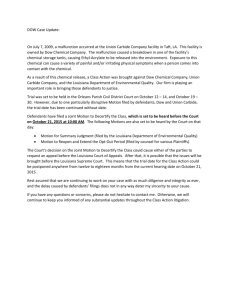
![[Click and Enter Attorney Name], State Bar No - E](http://s3.studylib.net/store/data/007177564_1-4d9407aff5e1ecb2a5922cd955484ee2-300x300.png)
